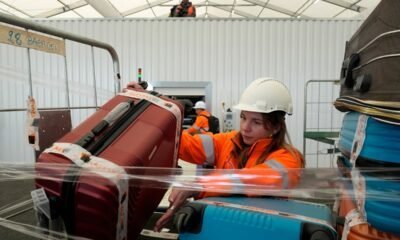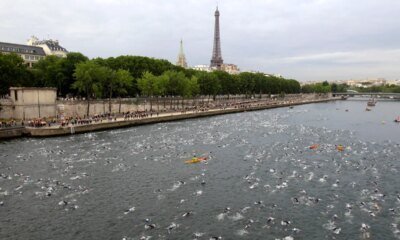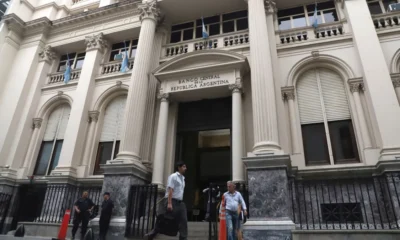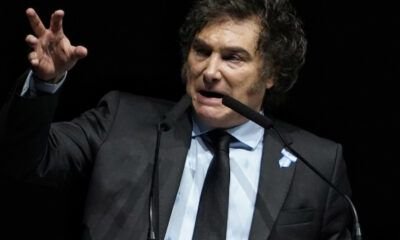INTERNACIONAL
Paris prepares for 100-day countdown to Olympics, aiming to reignite passion for the Games
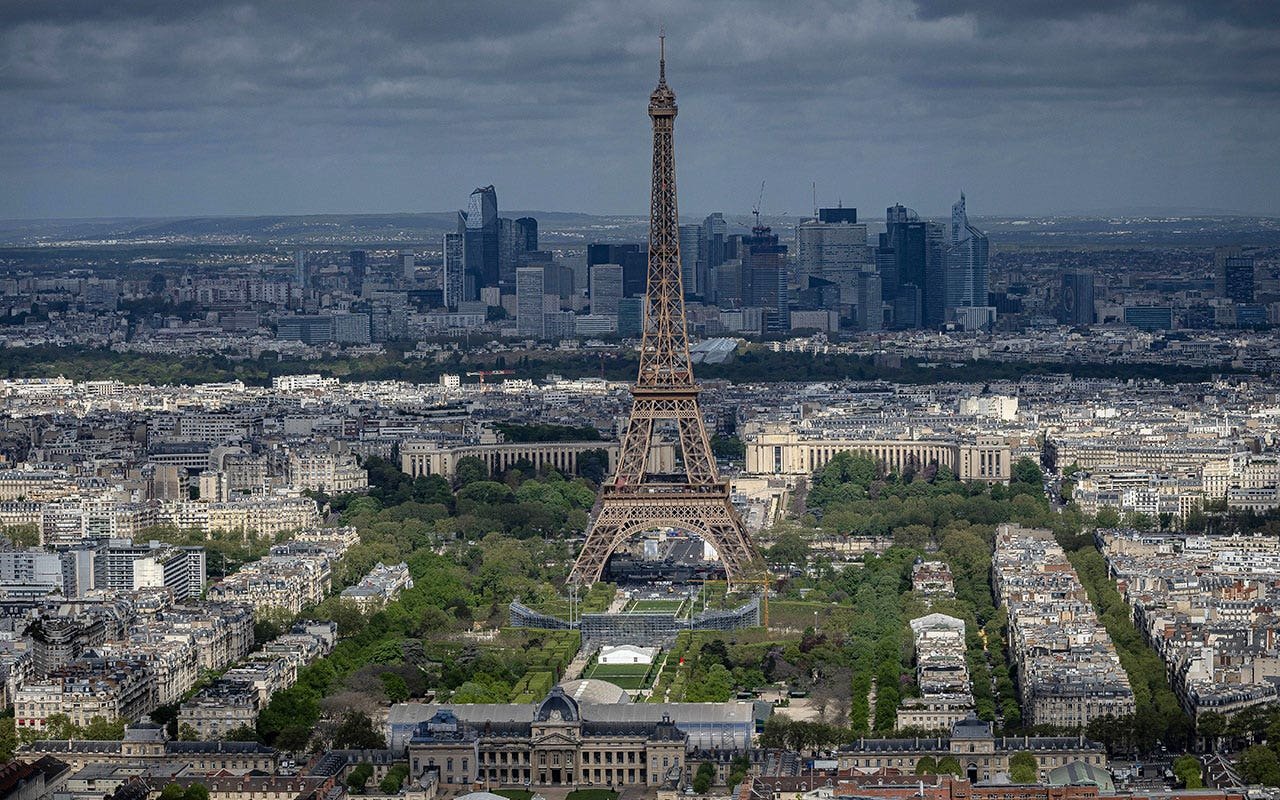
- April 17 marks the 100-day countdown to the Paris Olympics opening ceremony.
- Paris officials say they are aiming for a socially positive, less polluting and less wasteful Games, setting a new standard for future events.
- Many Parisians plan to leave, to avoid the disruptions or to rent their homes to the expected 15 million visitors.
In Paris’ outskirts, a bright-eyed young girl is eager for the Olympic and Paralympic Games to end.
That’s because the swimming club where 10-year-old Lyla Kebbi trains will inherit an Olympic pool. It will be dismantled after the Games and trucked from the Olympic race venue in Paris’ high-rise business district to Sevran, a Paris-area town with less glitter and wealth. There, the pieces will be bolted back together and — voila ! — Kebbi and her swim team will have a new Olympic-sized pool to splash around in.
«It’s incredible !» she says. «I hope it’s going to bring us luck,» adds her mother, Nora.
US OLYMPIC UNIFORM FOR TRACK ATHLETES SPARKS CONCERNS ABOUT COVERAGE: ‘EVERYTHING’S SHOWING’
In 100 days as of Wednesday, the Paris Olympics will kick off with a wildly ambitious waterborne opening ceremony. But the first Games in a century in France’s capital won’t be judged for spectacle alone. Another yardstick will be their impact on disadvantaged Paris suburbs, away from the city-center landmarks that are hosting much of the action.
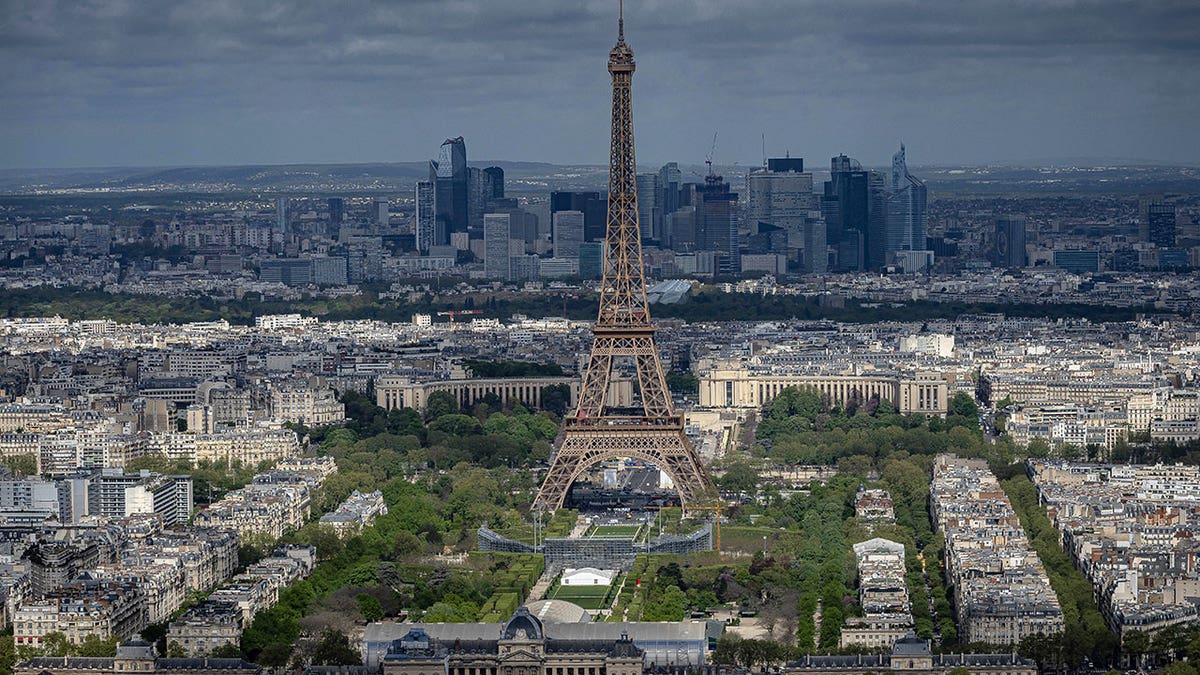
Stands are seen under construction on the Champ-de-Mars with the Eiffel Tower on April 15, 2024, in Paris. April 17 marks the 100-day countdown to the Paris Olympics opening ceremony. (AP Photo/Aurelien Morissard)
By promising socially positive and also less polluting and less wasteful Olympics, the city synonymous with romance is also setting itself the high bar of making future Games generally more desirable.
Critics question their value for a world grappling with climate warming and other emergencies. Potential host cities became so Games-averse that Paris and Los Angeles were the only remaining candidates in 2017 when the International Olympic Committee selected them for 2024 and 2028, respectively.
After scandals and the $13 billion cost of the pandemic-delayed Tokyo Games in 2021, unfulfilled promises of beneficial change for host Rio de Janeiro in 2016 and the 2014 Winter Games in Sochi tarnished by Russian doping and President Vladimir Putin’s subsequent land grabs in Ukraine, the Switzerland-based IOC has mountains of skepticism to dispel.
AS MANY CITIES SOUR ON HOSTING THE OLYMPICS, SALT LAKE CITY’S ENTHUSIASM ENDURES
Virtuous Summer Games in Paris could help the long-term survival of the IOC’s mega-event.
SPREADING BENEFITS BEYOND CENTRAL PARIS
The idea that the July 26-Aug. 11 Games and Aug. 28-Sept. 8 Paralympics should benefit disadvantaged communities in the Seine-Saint-Denis region northeast of Paris was built from the outset into the city’s plans.
Seine-Saint-Denis is mainland France’s poorest region. Thanks to generations of immigration, it also is vibrantly diverse, counting 130 nationalities and more than 170 languages spoken by its 1.6 million inhabitants. For Seine-Saint-Denis kids facing racial discrimination and other barriers, sports are sometimes a route out. World Cup winner Kylian Mbappé honed his silky soccer skills as a boy in the Seine-Saint-Denis town of Bondy.
Once heavily industrialized, Seine-Saint-Denis became grim and scary in parts after many jobs were lost. Rioting rocked its streets in 2005 and again last year. Members of an Islamic extremist cell that killed 130 people in the French capital in 2015 hid after the carnage in an apartment in the town of Saint-Denis and were killed in a shootout with heavily armed SWAT teams. That drama unfolded just a 15-minute walk from the Olympic stadium that will host track and field and rugby and the closing ceremonies.
Concretely, the Games will leave a legacy of new and refurbished sports infrastructure in Seine-Saint-Denis, although critics say the investment still isn’t enough to catch it up with better equipped, more prosperous regions.
Mamitiana Rabarijaona grew up close to the Olympic stadium, built originally for the 1998 soccer World Cup. He says it didn’t provide much of a boost for Seine-Saint-Denis residents. He believes the Olympics will be «a big party» and he will be among 45,000 volunteers who’ll be helping. But he is not expecting Olympic-related investments to magically erase Seine-Saint-Denis’ many difficulties.
«It’s like lifting the carpet and brushing the dust underneath,» he said. «It doesn’t make it go away.»
Seine-Saint-Denis got the new Olympic village that will become housing and offices when the 10,500 Olympians and 4,400 Paralympians have left. It also is home to the Games’ only purpose-built competition venue, an aquatics center for diving, water polo and artistic swimming events. Other competition venues already existed, were previously planned or will be temporary.
«We really were driven by the ambition of sobriety and above all not to build sports facilities that aren’t needed and which will have no reason to exist after the Games,» Marie Barsacq, the organizing committee’s legacy director, said in an interview.
The hand-me-down 50-meter pool for Sevran will be a significant upgrade. The Seine-Saint-Denis town of 51,000 people was whacked by factory closures in the 1990s. Its existing 25-meter pool is nearly 50 years old.
Other Seine-Saint-Denis towns are also getting new or renovated pools — particularly welcome for the region’s children, because only half of them can swim.
«The ambition for these Olympic Games … is that they benefit everyone and for the longest time possible,» said Sevran Mayor Stéphane Blanchet. The Olympics, Blanchet said, can’t «carry on just passing though and then moving on without thinking about tomorrow.»
PARIS’ COSTS COMPARE FAVORABLY
At close to $9.7 billion, more than half from sponsors, ticket sales and other non-public funding, Paris’ expenses so far are less than for the last three Summer Games in Tokyo, Rio and London in 2012.
Including policing and transport costs, the portion of the bill for French taxpayers is likely to be around $3.25 billon, France’s body for auditing public funds said in its most recent study in July.
Security remains a challenge for the city repeatedly hit by deadly extremist violence. The government downsized ambitions to have 600,000 people lining the River Seine for the opening ceremony. Citing the risk of attacks, it shelved a promise that anyone could apply for hundreds of thousands of free tickets. Instead, the 326,000 spectators will either be paying ticket-holders or have been invited.
CLICK HERE TO GET THE FOX NEWS APP
Privacy advocates are critical of video surveillance technology being deployed to spot security threats. Campaigners for the homeless are concerned that they will be swept off streets. Many Parisians plan to leave, to avoid the disruptions or to rent their homes to the expected 15 million visitors. With trade unions pushing for Olympic bonuses, strikes are also possible.
And all this against an inflammable backdrop of geopolitical crises including but not limited to the Israel-Hamas war and Russia’s invasion of Ukraine. As a consequence, the IOC isn’t allowing athletes from Russia and ally Belarus to parade with other Olympians at the opening ceremony.
Still, Olympics fans expect big things of Paris. They include Ayaovi Atindehou, a 32-year-old trainee doctor from Togo studying in France. The Olympic volunteer believes the Games can bridge divisions, even if just temporarily.
«The whole world without racial differences, ethnic differences, religious differences. We will be all together, shouting, celebrating,» he said. «We need the Olympic Games.»
INTERNACIONAL
Britons cast their votes in heavily-anticipated UK parliamentary election
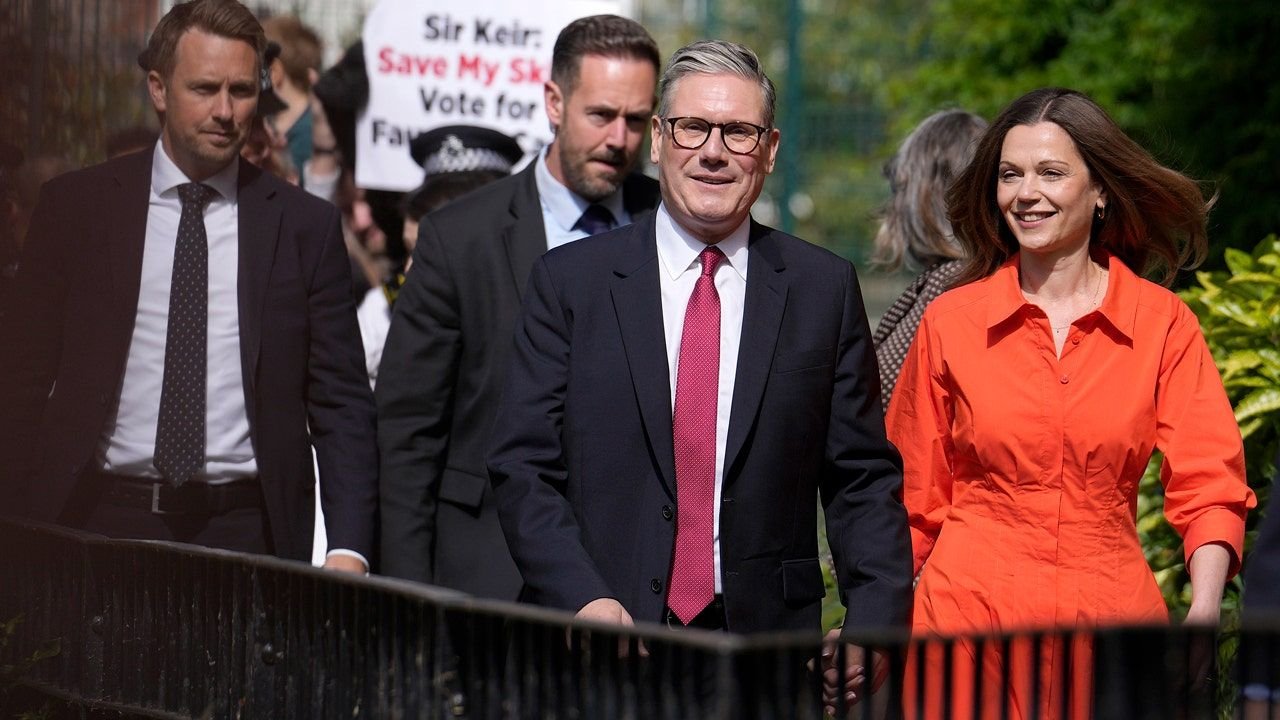
British voters were picking a new government Thursday in a parliamentary election widely expected to bring the Labour Party to power against a gloomy backdrop of economic malaise, mounting distrust in institutions and a fraying social fabric.
A jaded electorate is delivering its verdict on Prime Minister Rishi Sunak’s Conservative Party, which has been in power since 2010. Polls opened at 40,000 stations, including churches, a laundromat and a crematorium.
«Nothing has gone well in the last 14 years,» said London voter James Erskine, who was optimistic for change. «I just see this as the potential for a seismic shift, and that’s what I’m hoping for.»
NIGEL FARAGE’S RETURN TO POLITICS CAUSES WRINKLE IN BRITISH ELECTION: WHY HAS HE PROVEN SO SUCCESSFUL?
While Labour’s steady and significant lead in the polls would appear to buck recent rightward electoral shifts in Europe, including in France and Italy, many of those same populist undercurrents flow in Britain. Reform UK leader Nigel Farage has roiled the race with his party’s anti-migrant «take our country back» sentiment and undercut support for the Conservatives, who already faced dismal prospects.
Hundreds of communities were locked in tight contests in which traditional party loyalties come second to more immediate concerns about the economy, crumbling infrastructure and the National Health Service.
In Henley-on-Thames, about 40 miles west of London, voters like Patricia Mulcahy, who is retired, sensed the nation was looking for something different. The community, which normally votes Conservative, may change its stripes this time.
«The younger generation are far more interested in change,’’ Mulcahy said. «So, I think whatever happens in Henley, in the country, there will be a big shift. But whoever gets in, they’ve got a heck of a job ahead of them. It’s not going to be easy.»
Britain has experienced a run of turbulent years — some of it of the Conservatives’ own making and some of it not — that has left many voters pessimistic about their country’s future. The U.K.’s exit from the European Union followed by the COVID-19 pandemic and Russia’s invasion of Ukraine battered the economy, while lockdown-breaching parties held by then-Prime Minister Boris Johnson and his staff caused widespread anger.
Johnson’s successor, Liz Truss, rocked the economy further with a package of drastic tax cuts and lasted just 49 days in office. Rising poverty and cuts to state services have led to gripes about «Broken Britain.»
Labour Party leader Keir Starmer and wife Victoria arrive at a polling station to cast their vote in London, Thursday, July 4, 2024. Voters in the U.K. are casting their ballots in a national election to choose the 650 lawmakers who will sit in Parliament for the next five years. Outgoing Prime Minister Rishi Sunak surprised his own party on May 22 when he called the election. (AP Photo/Vadim Ghirda)
The first part of the day was sunny in much of the country — favorable weather to get people to the polls.
In the first hour polls were open, Sunak made the short journey from his home to vote at Kirby Sigston Village Hall in his Richmond constituency in northern England. He arrived with his wife, Akshata Murty, and walked hand-in-hand into the village hall, which is surrounded by rolling fields.
The center-left Labour Party led by Keir Starmer has had a steady and significant lead in opinion polls for months, but its leaders have warned against taking the election result for granted, worried their supporters will stay home.
«Change. Today, you can vote for it,» he wrote Thursday on the X social media platform.
A couple of hours after posting that message, Starmer walked hand-in-hand with his wife, Victoria, into a polling place in the Kentish Town section of London to cast his vote. He left through a back door out of sight of a crowd of residents and journalists who had gathered.
Labour has not set pulses racing with its pledges to get the sluggish economy growing, invest in infrastructure and make Britain a «clean energy superpower.»
But nothing has really gone wrong in its campaign, either. The party has won the support of large chunks of the business community and endorsements from traditionally conservative newspapers, including the Rupert Murdoch-owned Sun tabloid, which praised Starmer for «dragging his party back to the center ground of British politics.»
The Conservatives have acknowledged that Labour appears headed for victory.
In a message to voters on Wednesday, Sunak said that «if the polls are to be believed, the country could wake up tomorrow to a Labour supermajority ready to wield their unchecked power.» He urged voters to back the Conservatives to limit Labour’s power.
Former Labour candidate Douglas Beattie, author of the book «How Labour Wins (and Why it Loses),» said Starmer’s «quiet stability probably chimes with the mood of the country right now.»
The Conservatives, meanwhile, have been plagued by gaffes. The campaign got off to an inauspicious start when rain drenched Sunak as he made the announcement outside 10 Downing St. Then, Sunak went home early from commemorations in France marking the 80th anniversary of the D-Day invasion.
Several Conservatives close to Sunak are being investigated over suspicions they used inside information to place bets on the date of the election before it was announced.
Sunak has struggled to shake off the taint of political chaos and mismanagement that’s gathered around the Conservatives.
But for many voters, the lack of trust applies not just to the governing party, but to politicians in general. Farage has leaped into that breach.
The centrist Liberal Democrats and environmentalist Green Party also want to sweep up disaffected voters.
CLICK HERE TO GET THE FOX NEWS APP
«I don’t know who’s for me as a working person,» said Michelle Bird, a port worker in Southampton on England’s south coast who was undecided about whether to vote Labour or Conservative. «I don’t know whether it’s the devil you know or the devil you don’t.»
-
POLITICA3 días ago
La reacción del Gobierno ante la suba del dólar blue: “No vamos a devaluar ni a corrernos del plan de Caputo”
-
POLITICA2 días ago
Tras la tensión diplomática, Lula quiere eliminar el acuerdo automotriz con Argentina
-
POLITICA3 días ago
Milei respondió el comunicado de Bolivia, insistió en que fue “un golpe montando” y criticó a Lula Da Silva
-
ECONOMIA3 días ago
Por la caída de la actividad económica, el superávit de Milei y Caputo está en riesgo
-
ECONOMIA2 días ago
Para el economista Orlando Ferreres, Luis Caputo anunció «un Plan Bonex con otro nombre»
-
POLITICA2 días ago
Gesto de Milei a Mauricio Macri: el Gobierno resigna su representante en la AGN y se lo cede al PRO





